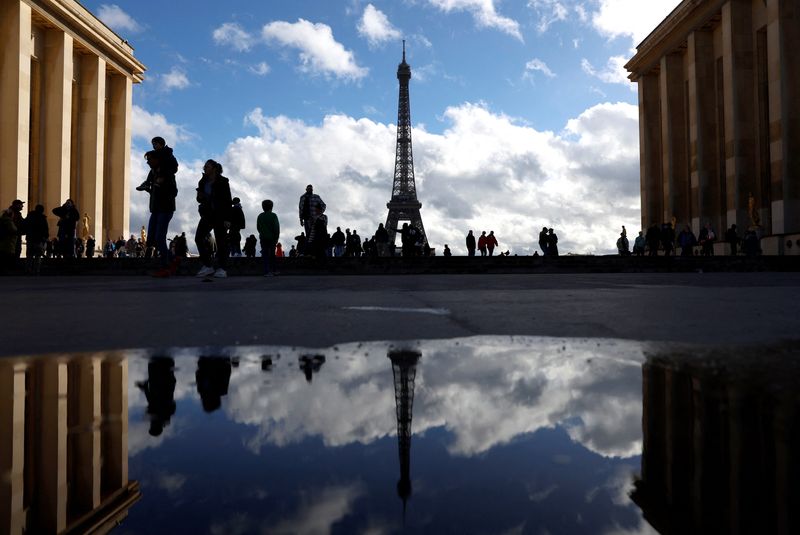By Giselda Vagnoni, Christoph Steitz and Joanna Plucinska
(Reuters) – France and Germany’s political crises are a setback for efforts to modernise Europe’s struggling economy and are already making it harder for companies to take the investment decisions they need to compete globally.
Government collapses in Germany and France – the big two economies that for decades have powered the European Union – come just as the region must navigate the return of Donald Trump to the White House and mounting trade tensions with China.
From French cognac-makers facing Chinese duties to German component manufacturers awaiting clarity on Europe’s industrial strategy for electric vehicles, the timing could not be worse.
Across the 27-nation bloc, few disagree that the region’s economies must be overhauled if they are to generate the wealth needed to sustain an ageing population of 450 million. But more than ever, the question is whether its politicians can deliver.
“The French crisis, together with the German one, must not slow down the implementation of the economic reforms,” Enrico Letta, author of a 147-page, EU-commissioned report this year on the weaknesses of the region’s economy, told Reuters.
The fall of President Emmanuel Macron’s government on Wednesday – just weeks after the implosion of the German coalition – is a “potential meteorite” for financial stability in a region struggling with high debt, he warned.
While many Europeans would not swap their quality of life and welfare safety nets for those of their American peers, the continent has fallen behind the United States in terms of economic growth per capita since the 2008 financial crisis.
Everything from weak productivity to fragmented capital markets and the wider banking sector has been blamed. Sanctions on Russia imposed after it invaded Ukraine have deprived European manufacturers of a cheap energy source.
With the rise of far-right and hard-left parties making it harder to reach consensus in national parliaments and EU institutions, the prospects for action on Europe’s long-term failings are not great.
Uncertainty caused by the collapsed German coalition government is “poison for us”, said Axel Petruzzelli, works council chief at the Stuttgart plant of car parts supplier giant Bosch (NS:BOSH). His company is awaiting urgent clarity on German industrial policy, particularly Berlin’s stance towards the EV sector, but that won’t come until after February’s election.
UNITED ON TRADE?
National carrier Lufthansa faces a similar radio silence from Berlin over its call for reductions in airport fees, which are much higher than elsewhere in Europe. One executive said it could even shift operations away to lower cost hubs like Rome.
Lufthansa did not respond to a request for comment on any potential move.
French jet engine-maker Safran (EPA:SAF) said last week that political stability was one key factor in a decision it will take early next year on the site of a new carbon brakes plant, with the United States and Canada shortlisted alongside France.
Moreover, the French parliament’s failure to agree a 2025 budget raises the prospect that the spending limits of this year’s budget will have to be rolled over as an emergency stopgap, even as inflation pushes costs higher across the board.
“In defence, that will create pressure,” Safran CEO Olivier Andries told reporters. “Beyond that, where the pressure will land and how the defence ministry will manage that, I can’t say.”
With Europe’s economy seen barely growing one percent this year, much hope is being placed on consumer spending leading a recovery next year as wage increases boost household incomes – but that assumes that shoppers do not start getting unnerved.
“This kind of political climate does not encourage consumption in general, and particularly for more significant purchases such as a new vehicle,” said Marc Mortureux, CEO of French autos lobby group La Plateforme automobile (PFA).
Europe prides itself on its open, trade-oriented economy. It is in trade where the most immediate challenges are to be found.
China’s move in October to impose anti-dumping duties on European brandy imports – days after the EU announced tariffs on Chinese EV imports – was potentially catastrophic for the sector, said French cognac association BNIC.
“The no-confidence vote … must in no way block these emergency steps on which the survival of many of our stakeholders depends,” BNIC said, referring to Macron’s promise to resolve the dispute with China.
Trump’s threat to impose tariffs of at least 10% on all U.S. imports is a test of Europe’s solidarity both as it decides how it can preempt those threats and how to retaliate if Trump goes ahead with them.
Yet all the inherent tensions in Europe’s trade policy – with individual nations all seeking to protect those sectors most crucial to their domestic economy – were cruelly on display this week as the EU initialled a trade deal with Brazil, Argentina, Uruguay, Paraguay and Bolivia.
Hailed as the EU’s largest ever trade deal, it would – if finalised – pit the German interest in nurturing new markets for its cars and machines against the French interest in defending its farming sector from imports.
For now, the political flux in Paris and Berlin makes its final fate all the more unclear. In the words of one French diplomatic source: “It’s not the end of the story.”

